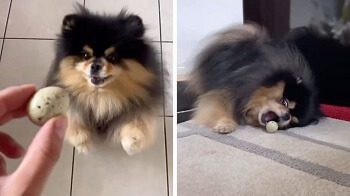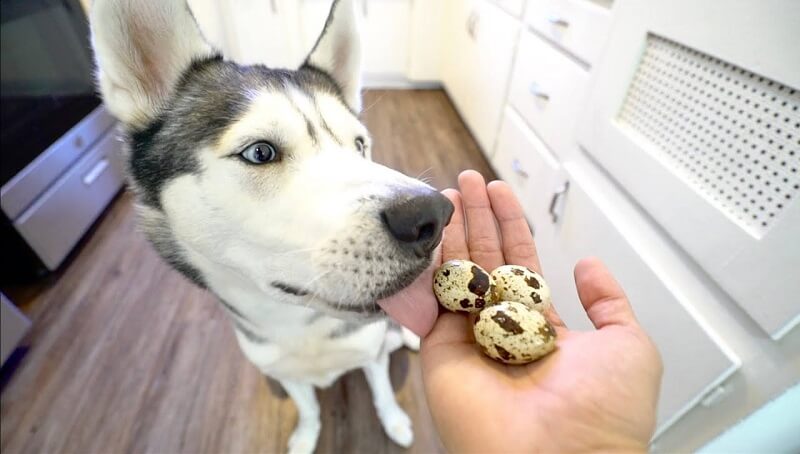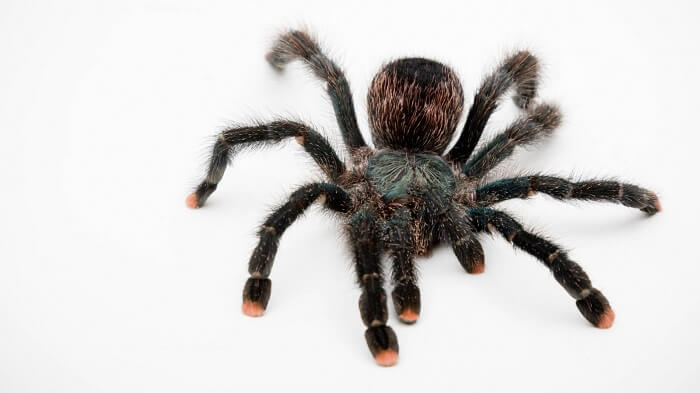Eggs, being rich in protein, are one of the foods that must be found more in our dog’s diet. In addition to protein, the amount of macronutrients and micronutrients makes them one of the most nourishing foods that exist. High-quality protein, ovalbumin, is found mainly in egg white but also in the yolk.
I am also talking about a food with a high biological value because it contains all the essential amino acids necessary for our dogs. These are the ones our dog cannot synthesize for itself and which it must obtain directly from the food it consumes.
So can I give quail eggs to my dog?
Quail eggs are safe and rich in the nutrients your dog needs. You can give your dog quail eggs, whether they are raw, cooked, or boiled, but scientists say that raw eggs have the most nutritional value and benefits.
Quail eggs also contain good fats for dogs, in the form of essential linoleic and alpha-linolenic fatty acids, mainly unsaturated and beneficial for their body. I should also highlight some minerals, such as iron, magnesium, zinc, selenium, and phosphorus, and a wide variety of vitamins soluble in fat like A, D, E, and K.
You might also like my articles on whether dogs can eat kettle corn, Vienna sausages, or freeze-dried strawberries.
For all this, the quail egg is an excellent option to add eggs to the diet of dogs, as it helps to form the nervous system and memory centers and provides antioxidants beneficial for visual health. It also has emulsifying, coagulating, thickening, aromatic and foaming powers, that make it a very pleasant food.
What dog breeds can eat quail eggs?
Quail eggs are smaller compared to turkey or chicken eggs and proportionally to their size they have the same nutritional value, just that they are easier to eat.
Quail eggs can be offered regardless of the type of breed and the age of the dog. They are recommended for senior or ill dogs and also for growing puppies as they contain all the necessary nutrients.
Can dogs eat cooked quail eggs?
To eliminate the risk of salmonella and guarantee a good uptake of nutrients for eggs, feed your dogs with boiled eggs. Avidin is denatured while cooking, which is beneficial to their body and will give them the needed proteins and fats.
You can offer quail eggs to your dog in the form of a French omelet, grated, cooked, and even roasted. All the options mentioned are healthy, but you will not, under any circumstances, add salt to the preparation of any of these egg meals, as it may be harmful to dogs.
Can dogs eat hard-boiled quail eggs?
Eggs can be given to the dog raw or cooked. Uncooked quail eggs better preserve their nutritional properties. But keep in mind, due to the fact that the uncooked egg white is indigestible, if you decide to give your dog eggs that haven’t been processed with heat, it is advisable to separate the egg yolk from the egg white and give it only the egg yolk. The egg white can be boiled separately or, if you prepare the dog’s food in the house, you can add the egg white at the end.
Can dogs eat frozen quail eggs?
It is very important to offer frozen quail eggs in the safest possible way for your dog. You will have to be careful so frozen eggs don’t have any leftover shells, cause if they do, they might hurt their throat. Another aspect to keep in mind is to not feed them eggs that are too cold cause they will end up with an upset stomach.
Are quail eggs healthy for dogs?
Quail eggs contain a large proportion of vitamins and minerals responsible for maintaining the essential functions of the organism. They also contain other nutrients such as carotenoids, lutein, and zeaxanthin, which help prevent cataracts and macular degeneration due to old age, which are major causes of blindness in older animals. Eggs also contain choline, an essential cell component, and recent studies have shown the important role of this substance in normal memory development.
Quail eggs contain:
- Vitamin A (contained in yolk) — essential for night vision and necessary for the maintenance of mucous membranes, skin, and growth;
- Vitamin D (contained in yolk) — helps to absorb calcium and phosphorus from the food and is thus essential for healthy bones and teeth;
- Vitamin B2 (riboflavin) — which helps to release energy from protein and fat;
- Vitamin B12 — is required for the formation of blood cells and nerve fibers;
- Iodine — required for the production of thyroid hormones, which controls a large part of the metabolic activities of the organism;
- Selenium – antioxidant (protects cell membranes against oxidation)
- Zinc – is essential for sexual growth and maturation, important in enzymatic activity.
How many quail eggs can you give a dog?
The amount of quail eggs recommended per week depends on the weight of the dog.
- A small dog (chihuahua, Pekinese, etc.) should eat anywhere between 2 and 4 eggs.
- A middle-sized dog (Spanish cocker, beagle, basset, etc.) can be given up to 6-8 eggs a week.
- And a large dog (German dogfish, German shepherds, etc.) can have two quail eggs in the food ration every day or almost every day.
How often can dogs eat quail eggs?
Quail egg is a complex food, indicated at least once a week in the dog’s diet, adult or puppy.
When the dog is growing, the weekly egg quantity can be slightly increased, but it is good not to exaggerate and always keep in touch with your current veterinarian.
Can dogs eat quail eggs every day?
In general, the recommendation for healthy quail egg consumption is between once and twice a week, although there is no dose that is generally suitable for a dog. Remember that each specimen, depending on age, size, breed, or health, will require a certain amount of nutrients.
In any case, if you consider giving quail eggs to your dog on a daily basis, it will be essential to consult your veterinarian, who will advise you, so you know how to prepare homemade food (either raw or cooked) for your best friend’s needs.
How do you feed quail eggs to dogs?
 If you are sure of the origin of the quail eggs and follow the recommendations for proper storage, feeding the dog with raw eggs should not pose a risk. On the other hand, cooking them eliminates any risk of contamination as well as the possible problems mentioned above
If you are sure of the origin of the quail eggs and follow the recommendations for proper storage, feeding the dog with raw eggs should not pose a risk. On the other hand, cooking them eliminates any risk of contamination as well as the possible problems mentioned above
But what’s better? Although cooking changes the composition and amount of nutrients, the reality is that the nutritional contribution does not vary significantly. In other words, a raw quail egg vs. a cooked quail egg will offer similar quantities for all its components.
The decision is reduced to your comfort and ease. However, I must point out that when you use raw quail eggs, they should only be added when you serve your puppy’s food. On the contrary, if you decide to cook them, you can mix and pore with the rest of the food to serve at lunch.
Getting calcium from the quail eggshell is a relatively simple task, resulting in a powder you can add to your dog’s food and also for your own consumption. The process is relatively simple and the final product can be stored in a glass jar.
What to do:
Save as many eggshells as possible.
Always wash the peels, trying to eliminate the rest of their contents, to avoid bacterial growth.
Dry the peels in the sun or use a cloth or paper towel to do so.
Preheat the oven to 180° C, and in a box, place the quail eggshells for 5 to 10 minutes.
Leave them to chill and then crush them; you can use a coffee mincer until you have a fine powder.
Add a teaspoon of powder to the food to add a little calcium to your diet. It is important to consult your veterinarian before doing so, as excess calcium may cause health problems.
Are quail eggs good for dogs with allergies?
Quail eggs are safe for dogs with any type of allergies and many owners observed that they are easier to eat when their dog is suffering from them. Others reported that quail eggs made their dogs less prone to fleas.
Quail eggs are an excellent option to be included in the diet of your dog, whether as an ingredient in a recipe or as a reward. The benefits are greater than any risks but remember to always take the necessary precautions.
If it is the first time your dog eats quail eggs, remember to do it in small portions, so you can identify a possible food allergy or adverse effect on the digestive system. As long as you see it’s okay, you can increase the amount.




